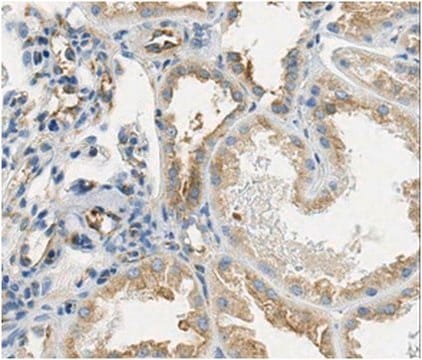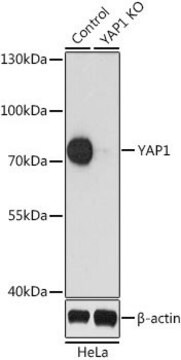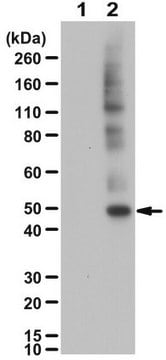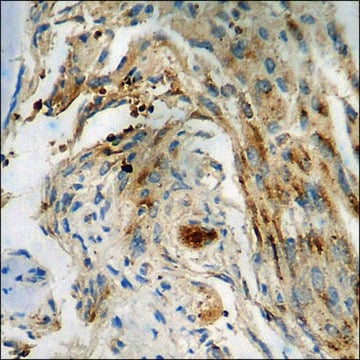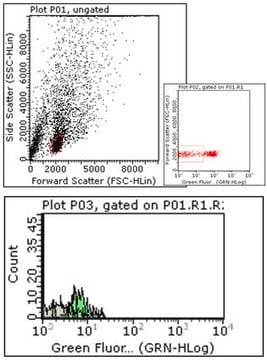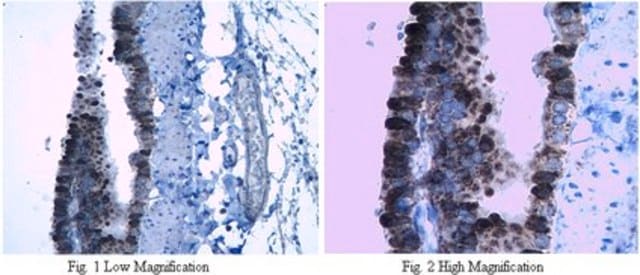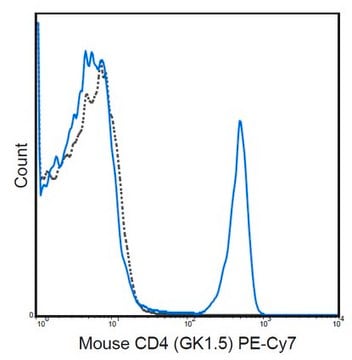MABS1916
Anti-c-Met Antibody, clone seeMet 13
clone seeMet 13, from mouse
別名:
Hepatocyte growth factor receptor, HGF receptor, HGF/SF receptor, Proto-oncogene c-Met, Scatter factor receptor, SF receptor, Tyrosine-protein kinase Met
About This Item
おすすめの製品
由来生物
mouse
品質水準
抗体製品の状態
purified immunoglobulin
抗体製品タイプ
primary antibodies
クローン
seeMet 13, monoclonal
化学種の反応性
human
テクニック
flow cytometry: suitable
immunocytochemistry: suitable
immunoprecipitation (IP): suitable
inhibition assay: suitable
アイソタイプ
IgG1κ
NCBIアクセッション番号
UniProtアクセッション番号
輸送温度
ambient
ターゲットの翻訳後修飾
unmodified
遺伝子情報
human ... HGF(3082)
関連するカテゴリー
詳細
特異性
免疫原
アプリケーション
細胞シグナル伝達
Flow Cytometry Analysis: A representative lot immunostained live SNU-5 cells. A slight decrease in antibody immunoreactivity was observed when the temperature was dropped from 37°C to 4°C (Wong, J.S., et al. (2013). Oncotarget. 4(7):1019-1036).
Immunocytochemistry Analysis: A representative lot immunostained live SNU-5 cells. Indirect fluorescence labelling following subsequent cell fixation and permeabilization revealed increased antibody cytoplasmic internalization when antibody incubation was performed at 37°C than at 4°C (Wong, J.S., et al. (2013). Oncotarget. 4(7):1019-1036).
Immunoprecipitation Analysis: A representative lot immunoprecipitated c-Met from SNU-5 cell lysate (Wong, J.S., et al. (2013). Oncotarget. 4(7):1019-1036).
Inhibition Analysis: A representative lot prevented HGF-induced scatter of HaCaT cells. Clone seeMet 13 inhibited cell proliferation by blocking cell division without inducing apoptosis (Wong, J.S., et al. (2013). Oncotarget. 4(7):1019-1036).
Note: seeMet 13 exhibited low reactivity and specificity towards denatured c-Met by Western blotting. This monoclonal antibody is not recommended for Western blotting application (Wong, J.S., et al. (2013). Oncotarget. 4(7):1019-1036).
品質
Immunocytochemistry Analysis: A 1:500 dilution of this antibody detected both surface and internalized c-Met by fluorescent immunocytochemistry staining of 4% paraformaldehyde-fixed, 0.3% Triton X-100-permeabilized SNU-5 cells.
ターゲットの説明
物理的形状
保管および安定性
Handling Recommendations: Upon receipt and prior to removing the cap, centrifuge the vial and gently mix the solution. Aliquot into microcentrifuge tubes and store at -20°C. Avoid repeated freeze/thaw cycles, which may damage IgG and affect product performance.
その他情報
免責事項
適切な製品が見つかりませんか。
製品選択ツール.をお試しください
保管分類コード
12 - Non Combustible Liquids
WGK
WGK 2
適用法令
試験研究用途を考慮した関連法令を主に挙げております。化学物質以外については、一部の情報のみ提供しています。 製品を安全かつ合法的に使用することは、使用者の義務です。最新情報により修正される場合があります。WEBの反映には時間を要することがあるため、適宜SDSをご参照ください。
Jan Code
MABS1916:
試験成績書(COA)
製品のロット番号・バッチ番号を入力して、試験成績書(COA) を検索できます。ロット番号・バッチ番号は、製品ラベルに「Lot」または「Batch」に続いて記載されています。
ライフサイエンス、有機合成、材料科学、クロマトグラフィー、分析など、あらゆる分野の研究に経験のあるメンバーがおります。.
製品に関するお問い合わせはこちら(テクニカルサービス)
